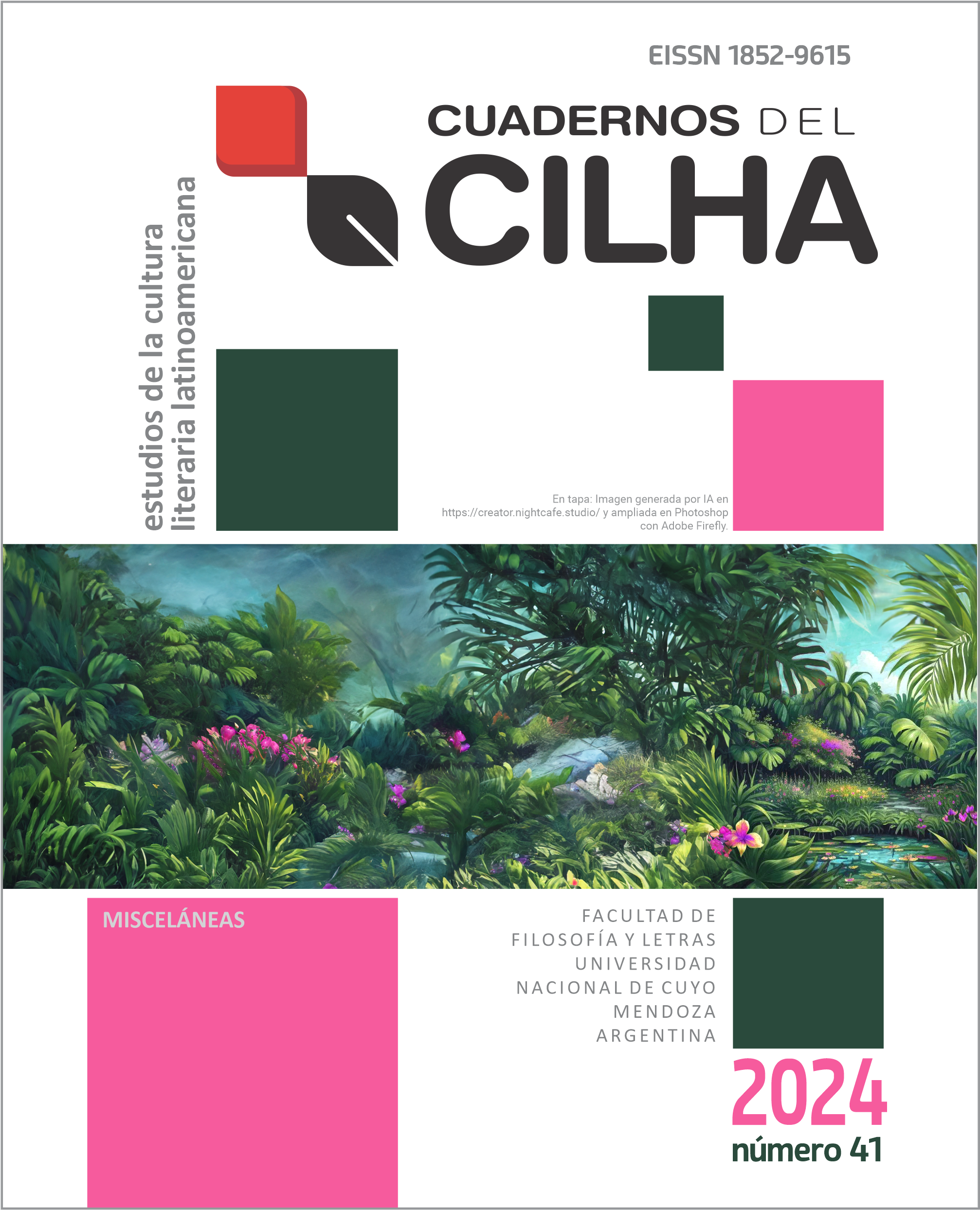Las revistas culturales como 'espacios de pasaje' en la transición democrática argentina
El “caso Villa María” en los ochenta
DOI:
https://doi.org/10.48162/rev.34.097Palavras-chave:
Villa María, revistas culturales, transición democrática, archivo, producción intelectualResumo
Este artículo se basa en el proyecto "Archivo de Revistas Culturales de Córdoba", dedicado a la recuperación, consignación y estudio crítico de las revistas culturales independientes producidas en la provincia de Córdoba, Argentina, durante los siglos XX y XXI. Se trata de un eslabón más en las investigaciones sobre revistas argentinas que pretende ampliar el desarrollo archivístico y crítico, en este caso circunscripto al territorio provincial. En particular, aquí abordamos un fenómeno observado en la ciudad de Villa María entre 1980 y 1992, donde se editaron diez revistas culturales casi sin solaparse entre sí. Analizaremos las revistas Impulso, Huérfanos y Río de Pájaros, de perfil periodístico, partiendo de un periodo tan importante para la historia política y cultural argentina como fue la transición democrática. Nuestras preguntas de investigación remiten a lo que el archivo es capaz de decir sobre la época: en primer término, cómo historizar desde el detalle los rasgos de producción estética, experimentación y debate (temas, escrituras, problemas reconocibles, vínculos autorales) que se desplegaron en las revistas con la intención de pensar el regreso de la democracia. En segundo lugar, qué interpretaciones surgen al pensar el corpus como un friso temporal, para analizar los rasgos de una lengua joven que comenzaba a hacerse visible a través de distintos géneros (narrativa, poesía, notas de opinión, historias gráficas, ilustraciones, cómics, producción crítica).
Referências
Altamirano, C. y Sarlo, B. (1983). Literatura/Sociedad. Edicial.
Arán. P. (2018). Escribir desde el archivo. En P. Arán y D. Vigna (editores), Archivos, artes y medios digitales. Teoría y práctica. (pp. 87-102). Edicea.
Argarate, N. (2022, 10 de septiembre). Comunicación personal. Villa María, Córdoba.
Badenes, D. (Comp.) (2017). Editar sin patrón. Club Hem.
Crespo, R. (coord.) (2010). Revistas en América Latina: proyectos literarios, políticos y culturales. UNAM.
Delgado, V. (2014). Algunas cuestiones críticas y metodológicas en relación con el estudio de revistas. En Tramas impresas. Publicaciones periódicas argentinas (siglos XIX-XX), coordinadoras V. Delgado, A. Mailhe y G. Rogers (La Plata: UNLP), 11-25.
Delgado, V. y Rogers, G. (Ed.) (2016). Tiempos de papel. Publicaciones periódicas argentinas (siglos XIX-XX). FaHCE, Universidad Nacional de La Plata.
Delgado, V.; Mailhe, A.; Rogers, G. (Coords.) (2014). Tramas impresas. Publicaciones periódicas argentinas (siglos XIX-XX). FaHCE, Universidad Nacional de La Plata.
Derrida, J. (1997). Mal de archivo. Una impresión freudiana. Trotta.
Garbatzky, I.; Gasparri, J. (2021). Nuestros años 80. A modo de presentación. En I. Garbatzky y J. Gasparri, Nuestros años 80 (pp. 5-10). CETyCLI-Hay Ediciones.
Mercadal, S. (2023). La experiencia de Los Libros y la tradición alternativa de Literal. Antecedentes y derivas de una crítica política de la cultura. [Tesis de doctorado inédita]. Facultad de Ciencias de la Comunicación, Universidad Nacional de Córdoba.
Mercadal, S.; Vigna, D. (2022). Los espacios negados. Crítica cultural y estéticas de escritura en la revista digital El Interpretador (2003-2011). Cuadernos de CiPeCo, 2(4), julio-diciembre: 34-57.
https://revistas.unc.edu.ar/index.php/CIPeCo/article/view/41756/41766
Patiño, R. (1997). “Intelectuales en Transición. Las revistas culturales argentinas (1981-1987)”. Cuadernos de Recienvenido, Posgraduación en Literatura Española e Hispano-América, 4, 5-34. http://dlm.fflch.usp.br/sites/dlm.fflch.usp.br/files/recienvenido04.pdf
Patiño, R. (2006). Revistas literarias y culturales argentinas de los 80. Ínsula: revistas de letras y ciencias humanas, 715-716. https://www.insula.es/sites/default/files/articulos_muestra/INSULA%20715-716.htm
Patiño, R. (2008). Revistas literarias y culturales. En J. Amícola y J. L. de Diego (eds.), La teoría literaria hoy. Conceptos, enfoques, debates, editores J. Amícola y J. L. de Diego (Editorial Al Margen), 154-170.
Petra, A. Revistas culturales y política en América Latina. Notas sobre un ciclo y su virtual ocaso. En R. Crespo y J. Guerra González (coords.), Revistas, blogs y portales latinoamericanos (1960-2020). Rupturas y transformaciones en el tránsito de lo impreso a lo digital (pp. 39-54). Quadrivium.
Richard, N. (2007). Fracturas de la memoria. Arte y pensamiento crítico. Siglo XXI.
Rivera, J. B. (1969). Las revistas literarias. Los Libros, 1(3): 19 (septiembre).
http://ahira.com.ar/rh/revistas/libros/01/003.pdf
Pérez, O. (2022, 7 de noviembre). Comunicación personal. Córdoba, Argentina-Madrid, España.
Sarlo, B. (1992). Intelectuales y revistas: razones de una práctica. Cahiers du CRICCAL, 9-10: 9-16. https://www.persee.fr/doc/ameri_0982-9237_1992_num_9_1_1047
Tarcus, H. (2020). Las revistas culturales. Giro material, tramas intelectuales y redes revisteriles. Tren en Movimiento.
Usubiaga, V. (2021). Retratos de época. Periodizar los ochenta desde las miradas cuerpo a cuerpo. En I. Garbatzky y J. Gasparri, Nuestros años 80 (pp. 51-66). CETyCLI-Hay Ediciones.
Weinberg, L. (2011). Presentación. Dossier Revistas en América Latina. Cuadernos Americanos, 137: 199-205.
Downloads
Publicado
Como Citar
Edição
Seção
Licença
Copyright (c) 2024 Diego Vigna, Gabriel Montali, Silvina Mercadal

Este trabalho está licenciado sob uma licença Creative Commons Attribution-NonCommercial 4.0 International License.












































